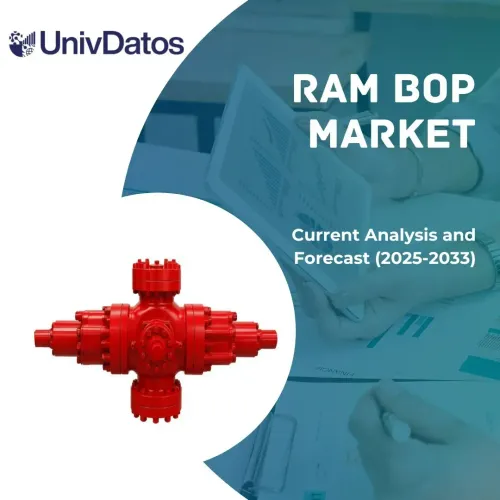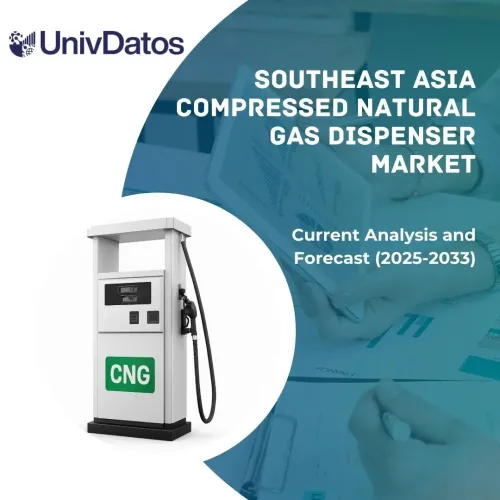- Home
- About Us
- Industry
- Services
- Reading
- Contact Us
AMI Gas Meter Market: Current Analysis and Forecast (2025-2033)
Emphasis on Type (Smart and Basic); End-Use (Residential, Commercial, and Industrial); and Region/Country
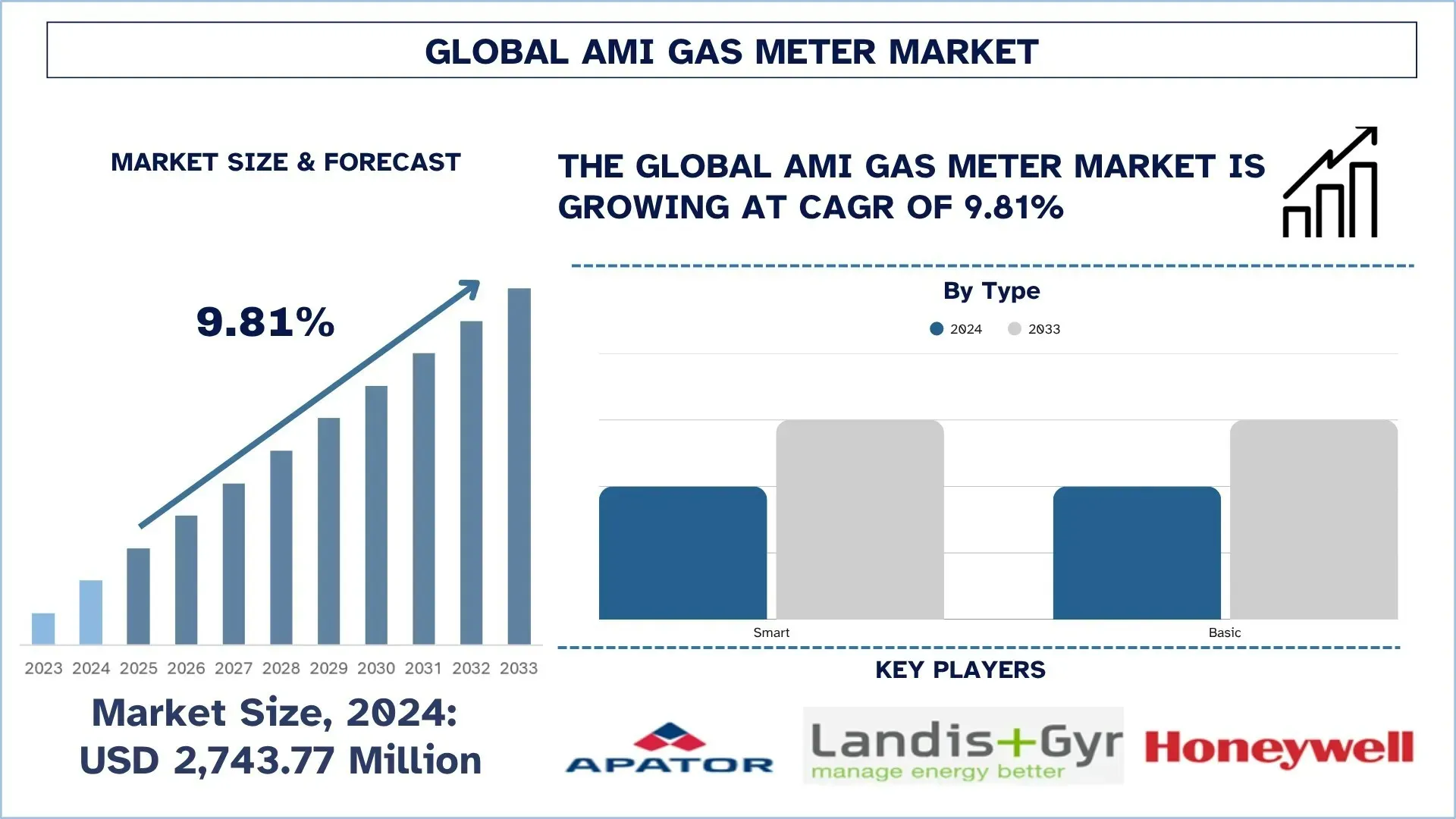
Global AMI Gas Meter Market Size & Forecast
The Global AMI Gas Meter Market was valued at USD 2,743.77 million in 2024 and is expected to grow at a strong CAGR of around 9.81% during the forecast period (2025-2033F), driven by the rising need for energy-efficient solutions and smart utility management, supported by government initiatives and smart city programs.
AMI Gas Meter Market Analysis
An advanced metering infrastructure (AMI) gas meters are smart devices that are used to measure the consumption of natural gas and send real-time usage data to service providers. These gas meters use two-way communication, allowing service providers to remotely monitor usage, detect leaks, and manage supply without manual readings. The global demand for energy-saving, real-time monitoring, and smart utility management solutions is accelerating market growth. The rising investment by the government in smart grid infrastructure and the integration of IoT devices and cloud computing platforms in gas meters are driving the market growth. Also, rapid urbanization, digitization, and sustainability initiatives are boosting the demand for smart metering systems that have the ability to improve energy utilization and support the integration of renewable energy sources.
Global AMI Gas Meter Market Trends
This section discusses the key market trends that are influencing the various segments of the global AMI gas meter market, as found by our team of research experts.
Growing Adoption of IoT Technology
The growing adoption of IoT technology is one of the prominent trends of the global AMI gas meter market. IoT-based meters provide real-time monitoring, two-way communication, and remote management, transforming traditional gas meters into smart meters. Service providers can keep track of consumption patterns, detect leaks, predict demand, and improve distribution networks, while consumers gain access to precise billing, usage insights, and improved safety. This trend is being boosted by the growing focus on smart cities and advanced infrastructure. Smart communication technologies, such as NB-IoT, LoRaWAN, and LTE-M, ensure data transfer from meters to centralized systems, thereby providing predictive maintenance, fault detection, and reducing operational costs. Cloud-based platforms and analytics further enhance the value of IoT-enabled AMI meters, allowing utilities to process large volumes of data and generate actionable insights for network optimization and energy efficiency programs. Therefore, the integration of IoT technology with AMI gas meters not only improves operational efficiency and safety but also positions these devices as an important part of smart, reliable, and future-ready energy infrastructure, making this trend one of the fastest-growing areas in the market.
AMI Gas Meter Industry Segmentation
This section provides an analysis of the key trends in each segment of the global AMI gas meter market report, along with forecasts at the global, regional, and country levels for 2025-2033.
The Smart AMI Gas Meters Market Dominates the Global AMI Gas Meter Market
Based on the type category, the market is categorized into smart and basic. Among these, the smart AMI gas meters market dominates the AMI gas meter market as these meters allow real-time data collection, two-way communication, remote monitoring, leak detection, and precise billing. Additionally, the rising government regulation, smart city programs, and increasing consumer demand for sustainable energy utilization and transparency are further driving the growth of the market. However, the basic AMI gas meter market is growing steadily due to its simplicity, affordability, and large demand in developing economies.
The Residential Segment Dominates the Global AMI Gas Meter Market
Based on the end-use category, the market is categorized as residential, commercial, and industrial. Among these, the residential segment currently holds the largest market. Urban and suburban households utilize these meters due to the increasing demand for accurate billing, energy management, smart monitoring of gas utilization, and operational cost. However, the industrial segment is showing the fastest growth as industries consume a large volume of gas and need an accurate monitoring system for managing their operational cost, improving safety, and detecting gas leaks.
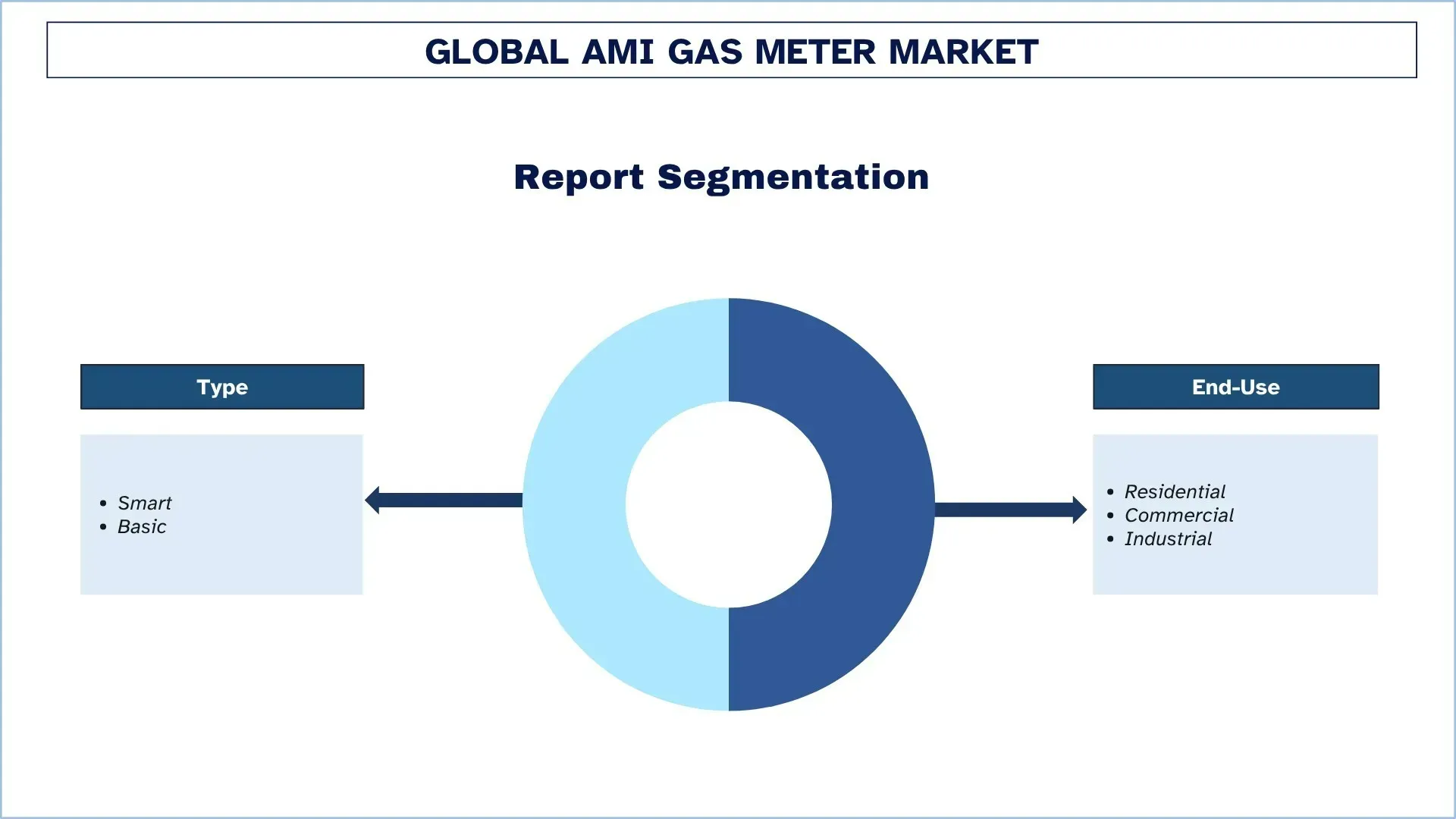
North America holds the largest market share in the global AMI Gas Meter market
North America has been the market leader due to its well-established infrastructure, early adoption of smart grid technology, and strong government rules and programs for energy management and smart metering. The region's well-established gas distribution and metering infrastructure has allowed service providers to easily integrate smart metering solutions, promoting the widespread adoption of AMI gas meters in various residential, commercial, and industrial sectors. Furthermore, government programs and initiatives for smart metering and energy management have further strengthened the position of the region. For example, the Grid Modernization Initiative, led by the U.S. Energy Department, promotes the adoption of AMI gas and energy meters, thereby making smart meters an important part of the energy system.
The U.S. held a Dominant share of the North America AMI Gas Meter Market in 2024
The U.S. leads the North America AMI gas meter market due to its well-established smart energy infrastructure, strong government regulations, and large-scale infrastructure investments. The country has been investing heavily in advanced metering infrastructure (AMI) to improve energy management, billing, and minimize carbon emissions. Additionally, federal and state-level programs are encouraged to adopt smart gas meters. Moreover, rapid partnerships between major companies like Itron, Honeywell, Landis+Gyr, and Aclara and leading gas distribution companies have boosted large-scale AMI adoption.
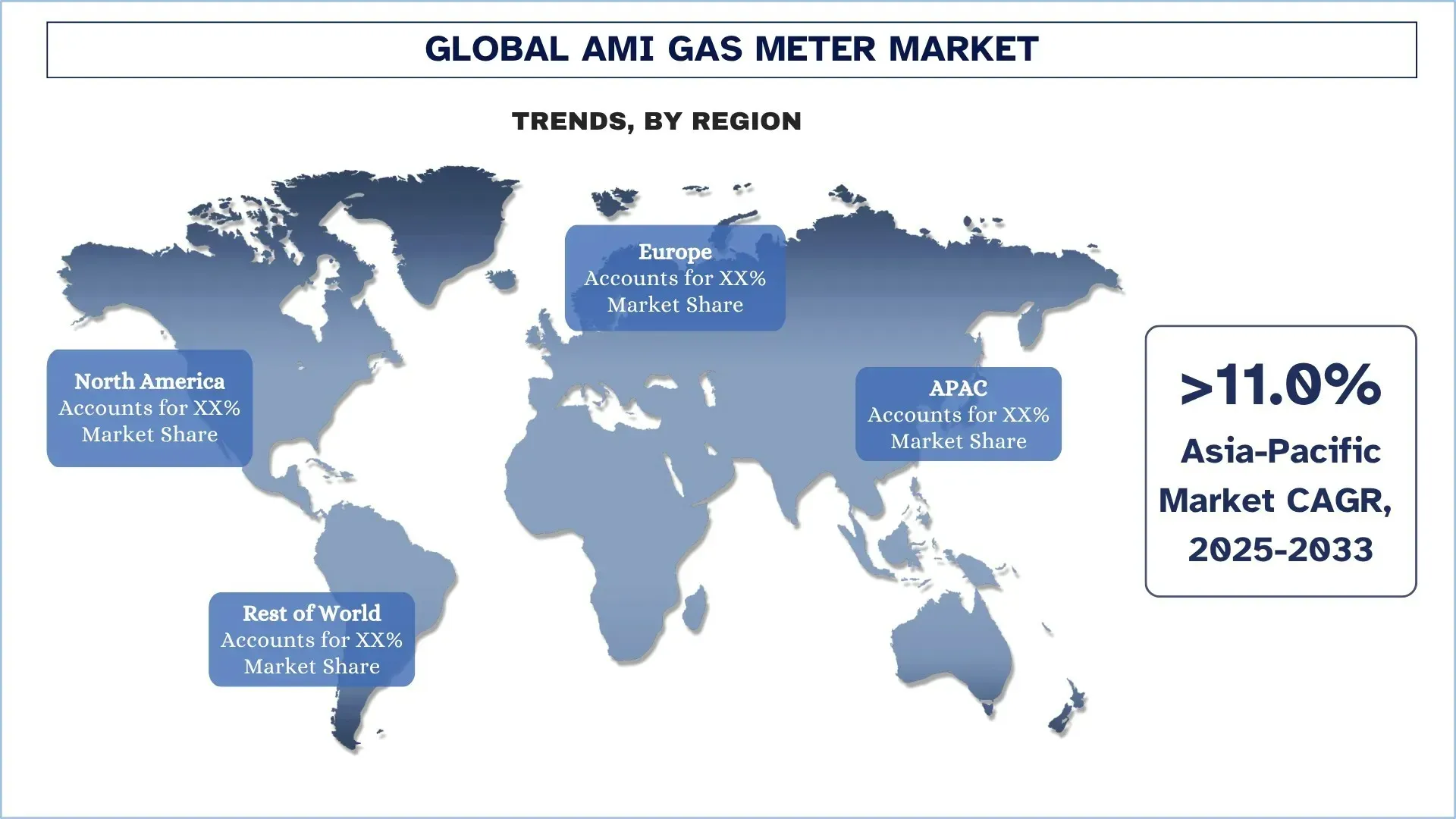
AMI Gas Meter Industry Competitive Landscape
The global AMI gas meter market is competitive, with several global and international market players. The key players are adopting different growth strategies to enhance their market presence, such as partnerships, agreements, collaborations, geographical expansions, and mergers and acquisitions.
Top AMI Gas Meter Market Companies
Some of the major players in the market are Apator S.A., Landis+Gyr Group AG, Honeywell International Inc., Pietro Fiorentini S.p.a., Sensus (Xylem), Wasion Holdings International, Diehl Stiftung & Co. KG, EDMI (Osaki Electric Co., Ltd), Itron Inc., and Aclara (Hubble).
Recent Developments in the AMI Gas Meter Market
In November 2023, Honeywell launched the world's first 100% hydrogen-capable diaphragm gas meter, the EI5 smart gas meter, in Europe. Successfully piloted in the Netherlands, the EI5 is designed to measure both hydrogen and natural gas, aligning with the European Green Deal's energy transition goals. Once installed, these meters eliminate the need for future replacements, reducing long-term costs and enhancing operational sustainability as gas networks transition to hydrogen.
In March 2023, Landis+Gyr Technology Inc., a subsidiary of Landis+Gyr Group AG, signed a new contract with Wisconsin’s WEC Energy Group to expand Advanced Metering Infrastructure (AMI) coverage for both gas and electricity meters and extend an existing managed services agreement through 2038, pending regulatory approval. Under the deal, Landis+Gyr supplied 210,000 ultrasonic G480 gas meters, 750,000 AMI gas modules, and 204,000 advanced electric meters.
Global AMI Gas Meter Market Report Coverage
Report Attribute | Details |
Base year | 2024 |
Forecast period | 2025-2033 |
Growth momentum | Accelerate at a CAGR of 9.81% |
Market size 2024 | USD 2,743.77 million |
Regional analysis | North America, Europe, APAC, Rest of the World |
Major contributing region | The Asia-Pacific region is expected to dominate the market during the forecast period. |
Key countries covered | U.S., Canada, Germany, U.K., Spain, Italy, France, China, Japan, and India. |
Companies profiled | Apator S.A., Landis+Gyr Group AG, Honeywell International Inc., Pietro Fiorentini S.p.a., Sensus (Xylem), Wasion Holdings International, Diehl Stiftung & Co. KG, EDMI (Osaki Electric Co., Ltd), Itron Inc., and Aclara (Hubble) |
Report Scope | Market Trends, Drivers, and Restraints; Revenue Estimation and Forecast; Segmentation Analysis; Demand and Supply Side Analysis; Competitive Landscape; Company Profiling |
Segments Covered | By Type, By End-Use, and By Region/Country |
Reasons to Buy the AMI Gas Meter Market Report:
The study includes market sizing and forecasting analysis confirmed by authenticated key industry experts.
The report briefly reviews overall industry performance at a glance.
The report covers an in-depth analysis of prominent industry peers, primarily focusing on key business financials, type portfolios, expansion strategies, and recent developments.
Detailed examination of drivers, restraints, key trends, and opportunities prevailing in the industry.
The study comprehensively covers the market across different segments.
Deep dive regional level analysis of the industry.
Customization Options:
The global AMI gas meter market can further be customized as per the requirements or any other market segment. Besides this, UnivDatos understands that you may have your own business needs; hence, feel free to contact us to get a report that completely suits your requirements.
Table of Content
Research Methodology for the Global AMI Gas Meter Market Analysis (2023-2033)
We analyzed the historical market, estimated the current market, and forecasted the future market of the global AMI gas meter market to assess its application in major regions worldwide. We conducted exhaustive secondary research to gather historical market data and estimate the current market size. To validate these insights, we carefully reviewed numerous findings and assumptions. Additionally, we conducted in-depth primary interviews with industry experts across the AMI gas meter value chain. After validating market figures through these interviews, we used both top-down and bottom-up approaches to forecast the overall market size. We then employed market breakdown and data triangulation methods to estimate and analyze the market size of industry segments and sub-segments.
Market Engineering
We employed the data triangulation technique to finalize the overall market estimation and derive precise statistical numbers for each segment and sub-segment of the global AMI gas meter market. We split the data into several segments and sub-segments by analyzing various parameters and trends, including type, end-use, and regions within the global AMI gas meter market.
The Main Objective of the Global AMI Gas Meter Market Study
The study identifies current and future trends in the global AMI gas meter market, providing strategic insights for investors. It highlights regional market attractiveness, enabling industry participants to tap into untapped markets and gain a first-mover advantage. Other quantitative goals of the studies include:
Market Size Analysis: Assess the current and forecast market size of the global AMI gas meter market and its segments in terms of value (USD).
AMI Gas Meter Market Segmentation: Segments in the study include areas of type, end-use, and region.
Regulatory Framework & Value Chain Analysis: Examine the regulatory framework, value chain, customer behavior, and competitive landscape of the AMI gas meter industry.
Regional Analysis: Conduct a detailed regional analysis for key areas such as Asia Pacific, Europe, North America, and the Rest of the World.
Company Profiles & Growth Strategies: Company profiles of the AMI gas meter market and the growth strategies adopted by the market players to sustain the fast-growing market.
Frequently Asked Questions FAQs
Q1: What is the global AMI gas meter market’s current market size and growth potential?
As of 2024, the global AMI gas market is valued at USD 2,743.77 million and is projected to grow at an impressive CAGR of 9.81% from 2025 to 2033, driven by increasing demand for smart utility solutions and energy efficiency.
Q2: Which segment has the largest share of the global AMI gas meter market by type category?
The smart segment holds the largest share of the global AMI gas meter market due to its advanced features, including real-time monitoring, leak detection, and two-way communication.
Q3: What are the driving factors for the growth of the global AMI gas meter market?
Top growth drivers of the AMI gas meter market include:
• Rising demand for energy efficiency
• Increasing smart city initiatives
• Increasing government mandates for smart metering
Q4: What are the emerging technologies and trends in the global AMI gas meter market?
Emerging trends in the AMI gas meter market include:
• Growing adoption of renewable energy solutions and advanced analytics for predictive maintenance and operational efficiency.
• Growing adoption of IoT technology.
Q5: What are the key challenges in the global AMI gas meter market?
Key challenges in the AMI gas meter market include:
• High initial investment costs.
• Connectivity issues in remote areas
• Regulatory compliance requirements
Q6: Which region dominates the global AMI gas meter market?
North America dominates the global AMI gas meter market due to advanced infrastructure, regulatory support, and widespread adoption of smart grid and utility modernization programs.
Q7: Who are the key competitors in the global AMI gas meter market?
Top players in the AMI gas meter industry include:
• Apator S.A.
• Landis+Gyr Group AG
• Honeywell International Inc.
• Pietro Fiorentini S.p.a.
• Sensus (Xylem)
• Wasion Holdings International
• Diehl Stiftung & Co. KG
• EDMI (Osaki Electric Co., Ltd)
• Itron Inc.
• Aclara (Hubble)
Q8: What are the key growth opportunities in the global AMI gas meter market?
Growth opportunities include expansion in emerging economies, adoption of prepaid and industrial AMI gas meters, integration with IoT platforms, and increasing demand for energy-efficient smart utility solutions driven by regulatory incentives and sustainability initiatives.
Q9: How is the future outlook of the AMI gas meter market shaping up?
The market is projected to grow steadily, supported by urbanization, smart city projects, regulatory mandates, and technological advancements. Increasing investments in software analytics, predictive maintenance, and cloud integration are expected to further drive adoption globally.
Related Reports
Customers who bought this item also bought









